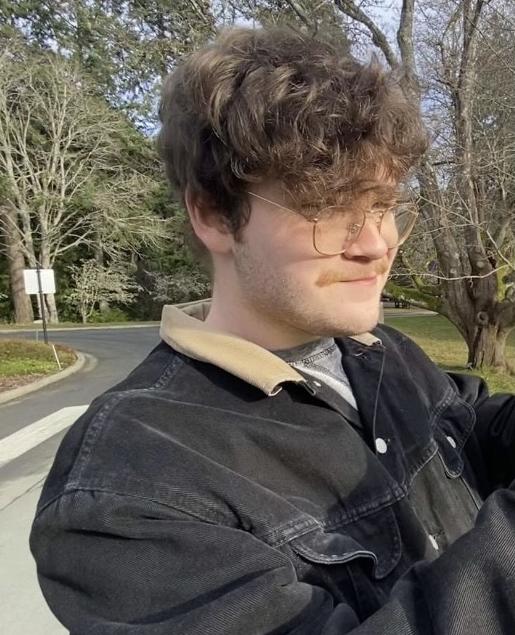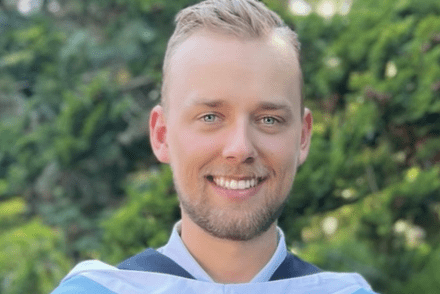Ethan Hummel shares his experience working at Nanaimo Museum
VIU History student Ethan Hummel put his classroom learning into practice at the Nanaimo Museum. He worked as a heritage interpreter at the museum through the Young Canada Works program this spring and last fall.
Ethan says his first-year history classes gave him a strong base for working in the Nanaimo Museum. He also gained a new perspective on Canadian history because the museum works closely with Snuneymuxw cultural knowledge experts and Elders.
We caught up with Ethan to talk about some highlights from his time working at the museum and what he learned.
Why did you choose VIU for your education?
I decided to come to VIU mainly because of my love for where I’m from. I grew up in Powell River and being in a place with the natural beauty and good weather of coastal BC was a huge motivator for me. It’s close to my hometown and I can visit regularly, but it’s a busy enough city to keep life interesting and fun.
Also, I found VIU to be more accessible to somebody like me who didn’t pursue STEM classes until later in high school.

Ethan Hummel
What are you most proud of achieving since you began your studies at VIU?
Since the start of my studies, I have been most proud of getting a 4.0 GPA with a full course load in the first semester of classes. I’ve always doubted my ability to perform under pressure, and my first year managed to break that misconception. I’m more confident in my academic ability since then. Also, getting involved with the History Students’ Association introduced me to so many wonderful people, and I’m proud of the connections I made and continue to make.
How is your program preparing you for what you want to do next?
Studying history at VIU gives you chances to engage with knowledgeable professors from all over Canada and the world, about a variety of subjects with tons of one-on-one dialogue and discussion-form classes. Also, through taking classes from other faculties, you can get advice about paths other than academics, such as law school, business school, and others.
Tell us about your experience working at the Nanaimo Museum.
At the museum, I was employed as a heritage interpreter. I essentially break down dense information in the exhibits and present it in a way as to pique the interest of whichever visitor(s) I’m speaking to. I helped with and delivered programs and tours to multiple age groups, which I enjoyed and learned a lot from. At certain times guests would come in with a bit of fascinating local history or old photos for the curator. Working with artifacts and cultural belongings for so long gave me a very real sense of the scale of Nanaimo and Vancouver Island’s history in a way that I wouldn’t have known otherwise. My job also gave me the opportunity to interact with the heritage buildings owned by the museum, such as the Bastion and the Miner’s Cottage, which sparked an interest in heritage architecture.
How have you used your classroom learning at the museum?
My first-year classes gave me a strong base for working in a museum setting. The study of history involves a lot of writing, especially incorporating sources and information in an intelligent and thoughtful manner and interpreting in a museum essentially involves the same skills, except in real-time. My writing and research skills assisted with and benefited from my time at the museum.
The topics I learned in class, specifically my classes in 19th and 20th-century Canadian history made me confident in the background information I presented regarding the different periods of Canadian colonial history as they applied to settler Nanaimo. Working in the museum also gave me a new perspective on the study of history in Canada and improved my research because the museum works closely with Snuneymuxw cultural knowledge experts and Elders.
What do you enjoy most about working at the museum?
The best part about working at the museum was the friendly atmosphere. Spending every weekend in a place outside of classes that promoted learning was amazing, not to mention the qualified and knowledgeable staff. I was given the chance to speak with so many people who had studied history and now were employed there in different fields, so I was introduced to a lot of potential paths I could pursue after my degree.
As a side note, the second semester of classes presented me with several health concerns, and the museum team and management went above and beyond to make sure I was accommodated, and I’m very grateful for it.
Related Posts
Got an article idea for the blog? Email students@viu.ca.

